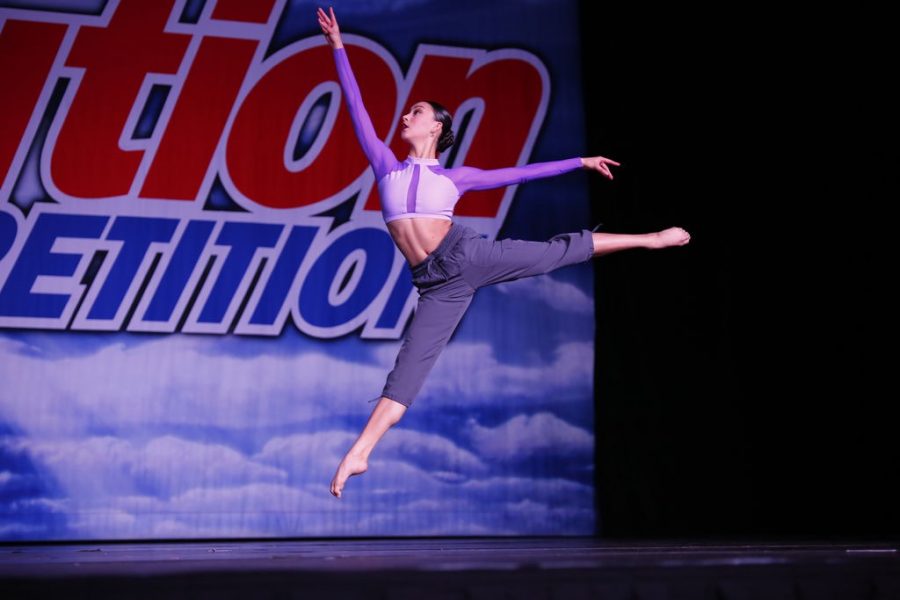Provided by Emmaline Fontanilla
Fontanilla at a dance competition this year. Despite all of the troubling times, being able to compete has been one of the highlights of Fontanilla’s year.
Emmaline Fontanilla: Food for Thought
Stereotypes have followed sophomore Emmaline Fontanilla in almost every aspect of her life, from school to her leisure time.
“There’s always been the stereotype for Asians to be smart, and I kind of fall into that,” Fontanilla said. “I’ve always been perceived as smart, so it’s hard for me to be like, ‘No, you can’t think that.’ But I know this one person who was like, ‘Are you the smart Asian girl? Can you just do my homework?’ And for me that was like, ‘Oh, you didn’t even try to learn my name.”
Fontanilla knows that her work ethic determined her intelligence, not her race.
“Just because I’m Asian, it doesn’t mean I’m smart. I’m smart because I’ve worked hard,” Fontanilla said.
Fontanilla also contends with the cultural differences of food she eats versus the accepted norm in the U.S.
“People always judge us based on our foods and what we eat, but I’m like, no it’s a cultural thing,” Fontanilla said. “Everyone may have a ‘weird dish’ that someone not from your culture may not understand, but it’s personal to you.”
Growing up in Hawaii and surrounded by her big Filipino family, Fontanilla has always connected with her culture through food.
“ I always had big family gatherings with my dad’s family,” she said. “We’d have like these big potlucks.”
Food has been an outlet for Fontanilla to spend time not only with her culture, but also her family.
“So really, our family bonding and our community came from food,” she said. “It was about the food in the community. I remember every time we left the house, it was always about the food. “It was like a buffet. We went camping together and there was a whole tent just dedicated for food. And that’s really how I grew up.”
Fontanilla’s father and three out of his seven siblings went to culinary school to further their expertise in the dishes that resonate with their Filipino heritage and Hawaiian birthplace.
“My dad always cooks these dishes for us that remind him of home,” Fontanilla said. “My dad cooks dishes that I assume he had when he was growing up, he always jokes that his parents always said, ‘cook like the whole neighborhood is coming over,’ so we always have leftovers for days.”
Fontanilla’s grandfather immigrated to Hawaii and worked in the sugar cane industry until he was able to bring over his wife. All of their kids were born in Hawaii. He was in the sugarcane fields and witnessed when the Japanese planes flew over on the day of Pearl Harbor. A family story Fontanilla heard when asking questions about her grandparents.
“I was just shocked,” Fontanilla said. “ It’s weird that such a significant event in American history was witnessed by someone in my family, I thought that was pretty cool, but also pretty terrifying.”
Today, Fontanilla spends most of her free time away from her family in dance class. In dance, Fontanilla has mixed emotions when it comes to what she is compared to what the dance realm desires.
“I feel like the ballet community is very toxic,” Fontanilla said. “You walk a very fine line, you have to be very careful when you are in the dance world. If you’re not perfectly 5 ‘5”, pale with long torso and long legs, you have to work very hard to find yourself. Because you can get caught up in the idea that you have to achieve perfection, which you can sometimes feel like you can’t do if you’re not white.”
As a child, Fontanilla had an obsession with wanting to be fully white.
“When I was younger, I really wanted to have the blonde hair and blue eyes,” Fontanilla said. “I was just really obsessed with that idea.”
Looking back, Fontanilla realizes she was trying to fit into an image of what society deemed beautiful.
“I’ve started to be able to recognize me trying to conform myself to society, trying to fit into the view,” she said.
Now, Fontanilla has learned to accept who she is and how she is different from those around her.
“I’m definitely more comfortable in my skin,” Fontanilla said. “I just love that I’ve just learned to love myself more as I’ve gotten older.”

